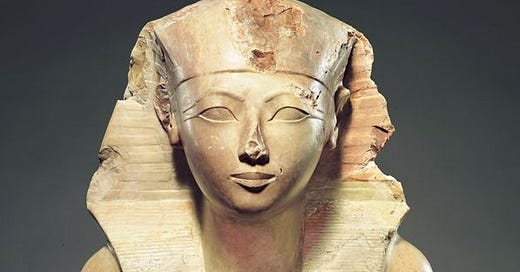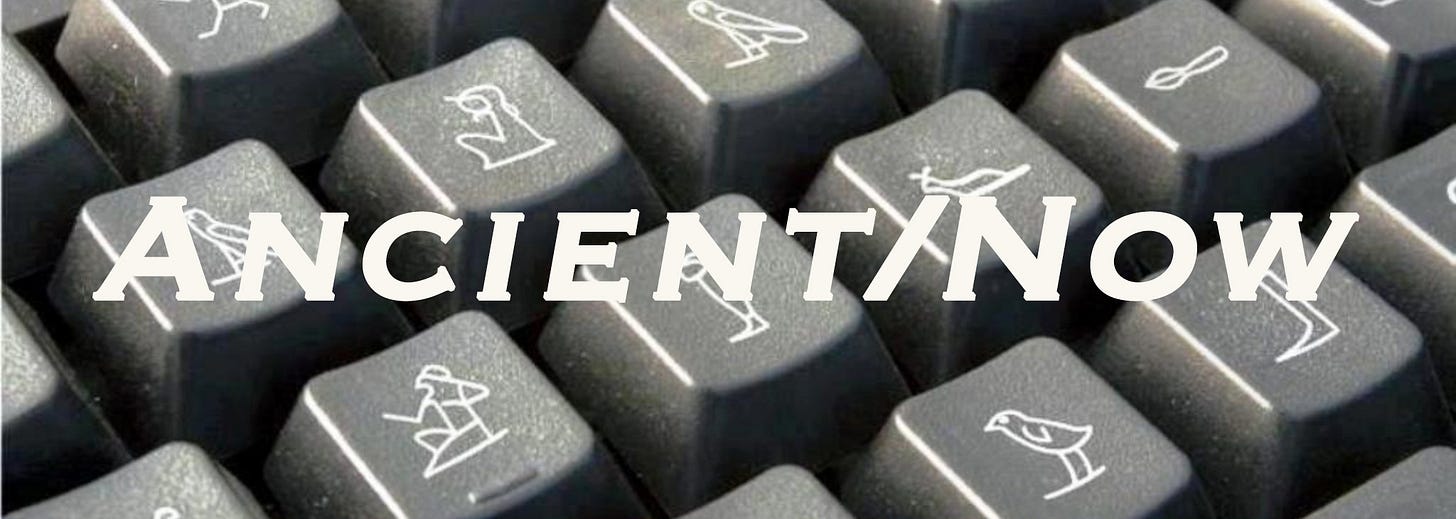Ancient/Now - January 16th
Hatshepsut's rise to power, the extraordinary story of ancient Egyptian artifacts unearthed in the Scottish countryside, and more
Hatshepsut and female power in ancient Egypt
In Kara’s interview with Unruly Figures’ host Valorie Clark Hatshepsut is the topic of discussion, particularly female power in ancient Egypt and the ways in which crisis and hereditary authoritarian regimes (in Egypt at least!) were more likely to remain open to handing the reins of power to a woman. In this podcast, Kara also discusses her biography of Hatshepsut, The Woman Who Would Be King, and the complicated and obfuscated story behind Hatshepsut’s rise to power. If you want a better understanding of women and power in the ancient world in less than forty-five minutes, this episode is a great place to start!
Ancient Egyptian treasures unearthed in the Scottish countryside

Yes, you read that right! The Guardian recently published an extraordinary story about ancient Egyptian artifacts unearthed at Melville House, which is located near Fife, Scotland. Melville House began as the wealthy home of the Earl of Melville in 1697, but by the 20th century it was being used as a school. In 1952 a schoolboy discovered a red sandstone head of a 12th Dynasty statue. If that weren’t extraordinary enough, we must note that the boy initially mistook the priceless antiquity for a potato. In 1966 some students uncovered a bronze statuette of an Apis bull. And in 1984 some teenagers excavated a bronze statuette of a man. Seems they had to find three discoveries over the course of thirty years before it became that a collection of ancient Egyptian antiquities were—strangely—buried in the grounds of Melville House. After this eureka moment, excavations conducted at Melville House yielded even more artifacts, and Dr. Elizabeth Goring, curator of Mediterranean archaeology at the National Museums Scotland at the time of the 1984 discovery, took on the task of solving the mystery of how (and why?!?!) these ancient Egyptian artifacts ended up buried in the Scottish countryside. The Guardian writes,
One possible explanation is that they were acquired by Alexander, Lord Balgonie, heir to the property, who visited Egypt in 1856 with his two sisters to improve his poor health after falling ill during service in the Crimean war. But he returned to Britain weaker, and died in 1857, aged only 24, from TB.
It is possible that grief and the sad association of the antiquities with his early death prompted someone to dispose of them. It also could be that stories of “the mummy’s curse”, dating to the 1860s, linked such antiquities with ill fortune, prompting someone to bury them.
Maitland, NMS’s principal curator of the Ancient Mediterranean, said: “We can’t be sure whether superstition played any role in their abandonment, but it’s not impossible.”
We will probably never get a definitive answer as to who exactly assembled the Melville House collection and why it came to be buried, but it is one of the most extraordinary archaeological stories we’ve encountered yet.
What else were we reading this week?
Person with rare tumor with teeth discovered in Egyptian burial from 3,000 years ago
Intact Etruscan Tomb Opened in Italy
Silver reveals luxury tastes of Vikings and trade talents of ancient Greeks
In Ohio, Ancient Mounds and Earthworks Gain Recognition—But Remain Imperiled
Larger-scale warfare may have occurred in Europe 1,000 years earlier than previously thought
The Hidden Costs of Working in the Art World
Michelangelo’s Secret Room of Sketches Opens to the Public in Italy
The Stories Behind the World’s Most Coveted Dyes
Archaeologists Unearth Giant Hall of Ancient King Famed for Gold Coffin
Archaeologists Discover Centuries-Old Prosthetic Hand in Germany
One more thing…
On a recent episode of Ancient Office Hours, Lexie Henning was joined by Dr. Rose Campbell. She spoke with Lexie about how she got into bioarchaeology and Egyptology and about her research on ancient human sacrifice, power, and violence.
Listen on Apple Podcasts, Spotify, or wherever you get your podcasts!
Okay, really, last thing…
Ancient Egypt featured on one of this week’s episodes of Jeopardy. Final Jeopardy was “This text helped the soul, or Ka, navigate into a region called Amenti.”
What is….. The Book of the Dead. Did you get it? But why is Jeopardy using the Coptic word for the underworld and not the Duat? Anyway…










